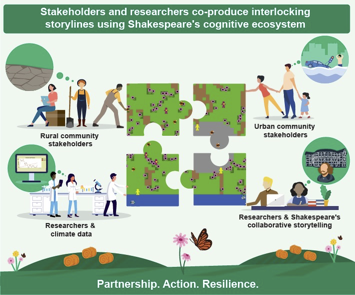Mind the Gaps! Climate Scientists Should Heed Lessons in Collaborative Storytelling from William Shakespeare
Community partners involved in co-producing climate information with climate scientists bring diverse knowledge, values, and perspectives. Engaging the full scope of their contributions is vital for obtaining successful, equitable responses to climate change.
Evocative tools that prompt partners to tell their weather and climate stories open gateways for understanding diverse needs and interests. The collective awareness that emerges from sharing stories enables intuitive recognition of all partners’ knowledge, values, and perspectives, and thus cohesiveness in developing responses to changing climate.
To co-produce locally relevant climate knowledge, climate scientists are engaging in new collaborations—with stakeholders and with scholars in the humanities, arts, and social sciences. In our work as a Shakespeare scholar-turned-public-humanist and a climate scientist, we have created a methodology that allows researchers and communities to co-produce knowledge by co-producing narratives. We combine principles from emerging climate “storylines” research with collaborative storytelling inspired by William Shakespeare’s plays and theatrical practices. Shakespeare’s plays spark collaborations and interpretations, in part, because of how Shakespeare leaves gaps in the narrative. These gaps allow others to enter as collaborators in collective awareness, creating a “cognitive ecosystem” that expands each other’s thinking and, in doing so, fosters knowledge and action among all engaged. Integrating these methods into producing climate storylines offers a radical paradigm: it overturns the scientist’s role as the prime expert and storyteller and fosters, instead, partnership, equity, and a co-exploration of multiple perspectives. It is time for researchers to promote a cognitive ecosystem of collaborative action.

